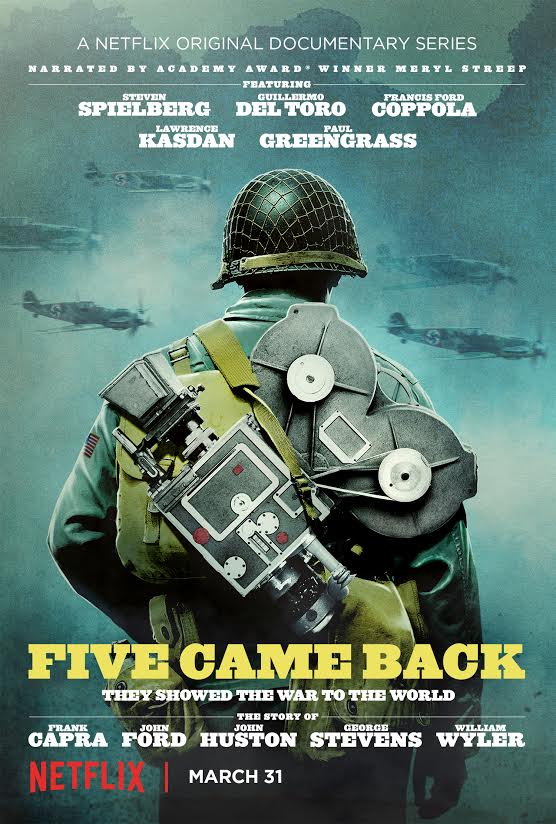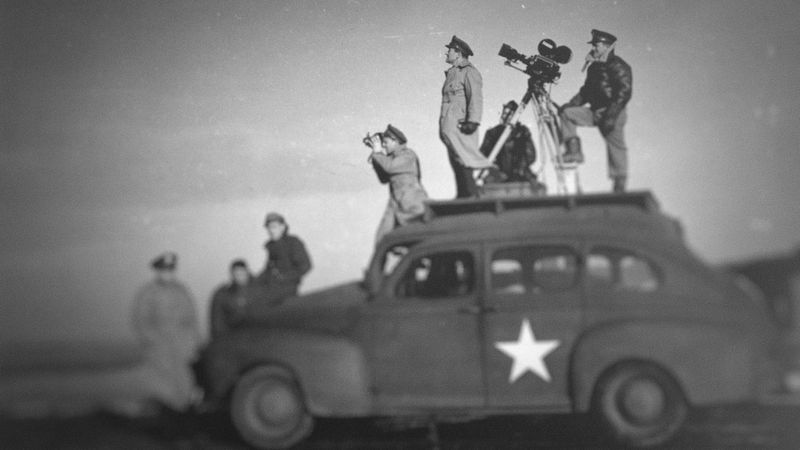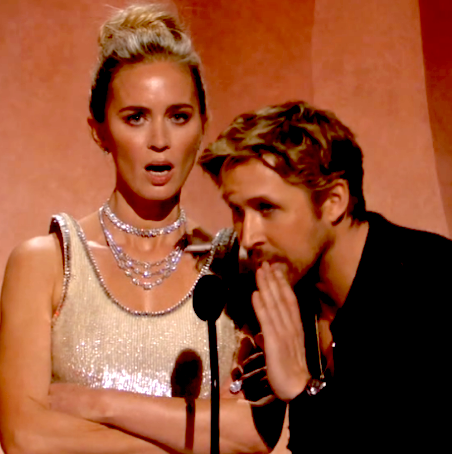Doc Corner: Is 'Five Came Back' Netflix's Oscar Moment?
 Tuesday, April 4, 2017 at 2:16PM
Tuesday, April 4, 2017 at 2:16PM by Glenn Dunks
 It can sometimes feel like we’ve seen WWII from so many perspectives that there can’t possibly be new ways to convey the weight of its tragedy. That Five Came Back, a new three-part mini-docu-series on Netflix, manages to succeed at doing this is just one of its many virtues. Adapted from Mark Harris’ book of the same name by Harris himself and directed by Laurent Bouzereau, this is a three-hour documentary about the work of five of Hollywood’s biggest directorial names of the 1930s who enlisted to support the American war effort the only way that they knew how: through film, and the personal battles they fought in order to do so.
It can sometimes feel like we’ve seen WWII from so many perspectives that there can’t possibly be new ways to convey the weight of its tragedy. That Five Came Back, a new three-part mini-docu-series on Netflix, manages to succeed at doing this is just one of its many virtues. Adapted from Mark Harris’ book of the same name by Harris himself and directed by Laurent Bouzereau, this is a three-hour documentary about the work of five of Hollywood’s biggest directorial names of the 1930s who enlisted to support the American war effort the only way that they knew how: through film, and the personal battles they fought in order to do so.
They were Frank Capra, John Huston, George Stevens, William Wyler and John Ford – the latter of whom gets the biggest laugh labelling documentaries in the 1930s as “silly things that rich kooks made” – each of whom left behind successful careers without the promise of anything when they came back.

If they came back at all. The series charts their early efforts before America’s entering the war after Pearl Harbour in 1941 before digging more deeply in the works that they produced from the front lines on the ground and in the skies....
In the series most prominent and potent narrative, Five Came Back details the thin line that each filmmaker had to walk between their own directorial authenticity and the propagandist objectives of the military that often requested they present missions as more successful than they were and at other times completely recreating incursions and attacks.
Like Leni Riefenstahl had done with her works of Nazi propaganda – films that had in a strange way inspired the directors even though their ideologies were opposite – the directors tried to find captivating forms of filmmaking in order to engage audiences back home. The most successful of the films made from this period, Wyler’s Memphis Belle: A Story of a Flying Fortress, utilised cameras in the air in order to capture the 25th mission of the titular aircraft, while John Huston’s The Battle of San Pietro may be one of the earliest examples of ‘mockumentary’ as the filmmaker recreated the handheld aesthetic of war documentaries and requested his soldier actors deliberately recognise the camera in order to make the faked footage appear realistic.

Narrated by Meryl Streep and featuring the talking heads of Steven Spielberg, Paul Greengrass, Guillermo del Toro and Francis Ford Coppola not to mention a striking wealth of appropriately used and superbly edited archival footage and movie clips, Five Came Back is fairly standard as documentaries go. Would I have appreciated more variety in the voices, perhaps some more surprising names who were inspired by the five who came back in less obvious ways? Definitely. Lord knows, it is a missed opportunity to not actually feature any contemporary, working documentarian in a film about documentary filmmaking and how those involved influenced and reverberated through the following generations (Greengrass' roots in documentaries are fleetingly mentioned just once). And considering representations of African Americans through the war efforts are sadly minimal, the existence of The Negro Soldier feels like the perfect place to offer a person of color the opportunity to offer their own thoughts on what a film like that would have meant to the black community of the time.
Whatever my quibbles regarding interview subjects, however, not a minute goes by across its 180 minutes that shouldn’t satiate filmlovers with fascinating words and images and stories from a remarkable moment in history. The most affecting moments come in episode three, the strongest of the trio. Firstly as George Stevens realizes his role as filmmaker goes beyond that of documentarian, but to a position of witness, something that was explored in feature length last year by Kirsten Johnson's Cameraperson. The footage he filmed of dead and decaying bodies at the Dachau concentration camp even became evidence at the Nuremberg Trials. And secondly, as John Huston struggles to get his PTSD masterpiece, Let There Be Light, seen by the public.
It makes for an appropriately sombre tone to end this project on. If the legacy of the five directors’ works during this time aren’t as dissected for their influence on modern documentary war documentary filmmaking as they could be, Five Came Back nonetheless still offers a compelling story of how five directors altered their history and our own. It is a fitting tribute to them as men as well as filmmakers that makes a compelling case for documentary as the most patriotic of film mediums.
Release: Streaming now on Netflix alongside 13 of the films made by Ford, Stevens, Wyler, Huston and Capra (including two Oscar winners for Best Documentary!)
Oscar Chances: Netflix have already released Five Came Back into cinemas as a three-hour event to qualify it for awards so you better believe they’re going to go down the O.J.: Made in America route (although why it wasn't just released as a three-hour movie I don't know!). They were no doubt pissed that the shoulda-been slam dunk of their first win for 13th was derailed by the controversial submission of the O.J. Simpson miniseries from ESPN. I can easily see Five Came Back winning, too, if the doc branch are excited by this new form of eligibility. Even though the doc branch is oddly reluctant to nominating films about films, the subject and its Hollywood lineage could easily propel it to a win.
The curious element will be critics who had no issue with upgrading O.J. to “film” status and in some way paved the way to its eligibility being deemed a non-issue by the organisations despite being produced by ESPN to be shown in episodic form. Will Netflix find the same success despite the lack of zeitgeist-hitting themes? Without the festival platform that many used to justify O.J.'s placement, will critics see Five Came Back as film or more as television in the traditional sense? Will something else come along and steal its thunder? HBO's documentary programmer, the great Sheila Nevins, said she was not on-side with this doc development, but noted "Just think of the Academy Award potential for 'The Jinx.' Too late, I guess." One can only imagine they're devising their own long-form contender as we speak.



Reader Comments (6)
It was captivating and very well made. The talking heads annoyed me a little bit because it felt that the point was just to have someone famous talk about someone famous but they can bring back Paul Greengrass any day. The third episode is vastly superior to the first two in my opinion. Movie lovers will eat it up. Non movie lovers will not look at it.
Frank Capra, John Ford, George Stevens, William Wyler. Including Alfred Hitchcock and Billy Wilder, the best movie directors the world ever had.
I'm sort of allergic to WWII movies at this point (Son of Saul being the most recent exception) but I have a feeling I'll watch this because I think I "should" and might end up enjoying it.
OJ mania was wonderful last year.
/3rtful Yeah, OJ mania was great last year and deservedly so ... b ut even though this was not about African Americans, it was tremendous!! Just sayin'
Tony T, Greengrass was my favourite, too.